Stockholm International Peace Research Institute
Stockholm International Peace Research Institute (SIPRI) is an international institute based in Stockholm. It was founded in 1966.[1]
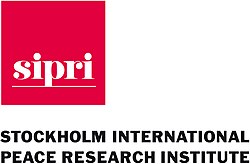 SIPRI's headquarters in Solna, Stockholm | |
| Abbreviation | SIPRI |
|---|---|
| Formation | 6 May 1966 |
| Founder | Tage Erlander, Alva Myrdal |
| Headquarters | Solna |
| Location |
|
Chair | Jan Eliasson |
Director | Dan Smith |
| Website | www |
SIPRI was ranked among the top three non-US world-wide think tanks in 2014 by the University of Pennsylvania Lauder Institute's Global Go To Think Tanks Report.[2] In 2019, SIPRI ranked 31st amongst think tanks globally.[3]
History
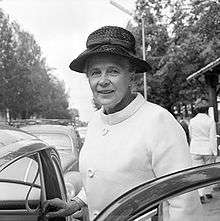
In 1964, Prime Minister of Sweden Tage Erlander put forward the idea of establishing a peace research institute to commemorate Sweden's 150 years of unbroken peace.
A Swedish Royal Commission chaired by Ambassador Alva Myrdal proposed in its 1966 report to establish an institute, later named the Stockholm International Peace Research Institute, SIPRI. The Institute's research should seek to contribute to "the understanding of the preconditions for a stable peace and for peaceful solutions of international conflicts" and the Commission recommended that research be concentrated on armaments, their limitation and reduction, and arms control. The Commission also recommended that SIPRI work be of "an applied research character directed towards practical-political questions [which] should be carried on in a constant interchange with research of a more theoretical kind".
SIPRI has built its reputation and standing on competence, professional skills, and the collection of hard data and precise facts, rendering accessible impartial information on weapon developments, arms transfers and production, military expenditure, as well as on arms limitations, reductions and disarmament. The task of the Institute is to conduct "scientific research on questions of conflict and cooperation of importance for international peace and security with the aim of contributing to an understanding of the conditions for peaceful solution of international conflicts and for a stable peace".
The Swedish Riksdag decided that the Institute be established on 1 July 1966 with the legal status of an independent foundation. All SIPRI research is based exclusively on open sources.
Organisation
SIPRI's organisation consists of a Governing Board, Director, Deputy Director, Research Staff Collegium and support staff. An Advisory Committee serves as a consultative body to the Institute. The Governing Board takes decisions on important matters concerning the research agenda, activities, organisation and financial administration of the Institute. Other matters are decided by the Director. The Research Staff Collegium advises the Director on research matters.
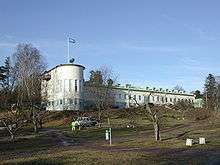
The staff of about 70 employees is mainly international, with 25 different nationalities reported in 2019[4]. The researchers are recruited for specific project periods and represent various academic disciplines. SIPRI also hosts guest researchers who work on issues related to research programmes as well as interns in relevant fields whose programmes of study can contribute to and benefit from SIPRI's research.
Governing board
Current members of the Governing Board:
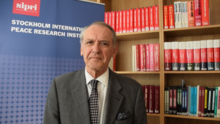
- Ambassador Jan Eliasson (Sweden), retired Swedish diplomat and former Deputy Secretary-General of the United Nations, as of 1 June 2017, Chair of the SIPRI Governing Board[5]
- Vladimir Baranovsky (Russia), Director, Center for Situation Analysis (CSA)
- Jean-Marie Guéhenno (France), Senior Advisor, Centre for Humanitarian Dialogue and a member of the UN Secretary General High-Level Advisory Board on Mediation[6]
- Dan Smith (United Kingdom), Director, SIPRI[7]
- Patricia Lewis (United Kingdom/Ireland), Research Director, International Security at Chatham House[8]
- Espen Barth Eide (Norway), Member of the Norwegian Parliament and former United Nations Special Adviser on Cyprus[9]
- Radha Kumar (India), Chair, United Nations University Council
- Jessica Tuchman Mathews (United States), Former President of Carnegie Endowment for International Peace and current Distinguished Fellow[10]
- Ambassador Ramtane Lamamra (Algeria), Member of the UN Secretary-General’s High-level Advisory Board on Mediation and Minister of Foreign Affairs of Algeria[11]
Former Governing Board Chairpersons:
- Alva Myrdal (1966–67)
- Gunnar Myrdal (1967–73)
- Rolf Edberg (1974–78)
- Hans Blix (1978)
- Karin Söder (1978–79)
- Rolf Björnerstedt (1979–85)
- Ernst Michanek (1985–87)
- Inga Thorsson (1987–91)
- Daniel Tarschys (1992–2000)
- Rolf Ekeus (2000–10)
- Göran Lennmarker (2010–14)
- Sven-Olof Petersson (2014-2017)
Director
The Director, who is appointed by the Swedish Government, has the main responsibility for SIPRI's work programme. Dr Bates Gill served as SIPRI Director from 2007–2012.[12] In September 2012, the Swedish Government appointed the German economist Tilman Brück as his successor.[13] Brück held the position of SIPRI Director from January 2013 to June 2014.[14] In June 2014 the SIPRI Governing Board appointed Dr Ian Anthony as Director for an interim period.[15] The current Director, Dan Smith, was appointed in September 2015.[7]
Former SIPRI Directors:
- Robert Neild (United Kingdom, 1967–71)
- Frank Barnaby (United Kingdom, 1971–81)
- Frank Blackaby (United Kingdom, 1981–86)
- Walther Stützle (Germany, 1986–91)
- Adam Daniel Rotfeld (Poland, 1991–2002)
- Alyson Bailes (United Kingdom, 2002–07)
- Bates Gill (United States, 2007–12)
- Tilman Brück (Germany, 2013–14)
- Ian Anthony (United Kingdom, interim 2014–15)
Deputy Director
The Deputy Director is appointed by the Governing Board from Swedish candidates. SIPRI's current Deputy Director is Sigrún Rawet.[16]
Former SIPRI Deputy Directors:
- Örjan Berner (1966–67)
- Dr Rolf Björnerstedt (1967–68)
- Jan Mårtensson (1968–69)
- Sven Hirdman (1969–72)
- Bo Heinebäck (1972–75)
- Carl-Magnus Hyltenius (1975–78)
- Arne Kjellstrand (1978–80)
- Sven-Göran Henricsson (1982–84)
- Gustaf Stjernberg (1984–87)
- Madeleine Ströje-Wilkens (1988–90)
- Ove Svensson (1992–93)
- Jan Svedman (1995–98)
- Birgitta Alani (1998–2002)
- Dr Christer Ahlström (2002–05)
- Daniel Nord (2005–12)
- Jakob Hallgren (2012–18).[17]
- Sigrún Rawet (2018–20)
Research
Research is conducted at SIPRI by an international staff of about 50 researchers and research assistants. The Institute's current research programme centres on the following major themes:
With the following research areas:
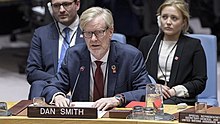
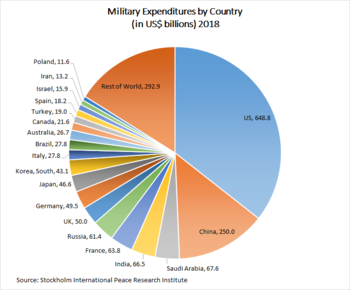
- Arms and Military Expenditure[21]
- Nuclear disarmament, Arms Control and Non-proliferation[22]
- Dual-use and Arms Trade Control[23]
- Emerging Military and Security Technologies[24]
- Africa[25]
- Asia[26]
- Europe[27]
- Middle East and North Africa[28]
- Climate Change and Risk[29]
- Environment of Peace 2022[30]
- Governance and Society[31]
- Sustainable Peace[32]
Publications and information
SIPRI's publications and information material are distributed to a wide range of policy makers, researchers, journalists, organisations and the interested public. The results of the research are disseminated through the publication of books and reports by SIPRI and commissioned authors as well as through symposia and seminars. The Institute has forged its profile by concentrating on present-day realities, providing unbiased facts to states and individuals.
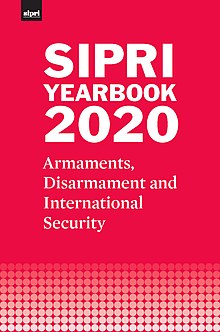
SIPRI's main publication, the SIPRI Yearbook, was first published on 12 November 1969. The Yearbook serves as a single authoritative and independent source to which politicians, diplomats and journalists can turn for an account of what has happened during the past year in armaments and arms control, armed conflicts and conflict resolution, security arrangements and disarmament. It is translated into a number of other languages, notably Russian, Ukrainian, Chinese and Arabic.
SIPRI series:[33]
- SIPRI Yearbook: Armaments, Disarmament and International Security[34]
- SIPRI Monographs
- SIPRI Research Reports
- SIPRI Chemical & Biological warfare Studies
- SIPRI Policy Papers
- SIPRI Insights on Peace and Security
- SIPRI Fact Sheets and Policy Briefs
- Multi-author volumes
- Pocket-size summaries of the Yearbook in English and a number of other languages
- SIPRI Arms Transfers Database, Iraq 1973-1990
Databases
SIPRI research projects maintain large databases on military expenditure, arms-producing industries, arms transfers, chemical and biological warfare, national and international export controls, arms control agreements, annual chronologies of major arms control events, military manoeuvres and nuclear explosions.
SIPRI Arms Transfers Database
Showing all international transfers of major conventional arms since 1950, The SIPRI Arms Transfers Database is the most extensive source of information on international arms transfers available to the public. The database is updated every spring, and is useful for anyone seeking to monitor and measure the international flow of major conventional arms.
SIPRI Mapping ATT-Relevant Cooperation and Assistance Activities Database
The SIPRI Mapping ATT-relevant Cooperation and Assistance Activities Database covers cooperation and assistance activities in regards to arms transfer and small arms and light weapons (SALW) controls since 2012. The database supports state's implementation of two treaties - the 2001 UN Programme of Action on SALW and the 2013 Arms Trade Treaty.
SIPRI Arms Industry Database
The SIPRI Arms Industry Database reports on the top 100 largest arms-producing and military services companies.
SIPRI Multilateral Peace Operations Database
This database contains data on personnel, country contributions, fatalities and budgets for all multilateral peace operations from year 2000 and onwards.
SIPRI Military Expenditure Database
Since 1959, the Military Expenditure Database has reported on the annual military spending of most countries around the world.
Events and conferences
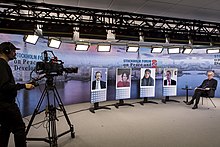
Within the fields of study, SIPRI arrange numerous workshops, conferences, seminars and lectures, bringing together an all-encompassing spectrum of expertise to exchange views on relevant themes. Among these events, the largest are the Stockholm Forum on Peace and Development and the Stockholm Security Conference.[35][36] In 2020, Stockholm Forum on Peace and Development was for the first time held online, convening 3700 registrants from 163 countries in virtual discussions on the theme of "Sustaining Peace in the Time of COVID-19".[37]
Finances
SIPRI's financial support is primarily drawn from governments and independent philanthropic organisations around the world. SIPRI also receives annual support from the Swedish government in the form of a core grant approved by the Swedish parliament.
See also
Peace research institutes
- Peace Research Institute Frankfurt
- Bonn International Center for Conversion
- International Peace Research Institute, Oslo
- Journal of Peace Research
- Tami Steinmetz Center for Peace Research
- Geneva International Peace Research Institute
Military budgets
- List of countries by military expenditures
- United Nations Security Council:
- Military budget of the People's Republic of China
- Military budget of Russia
- Military budget of the United States
External links
| Wikiquote has quotations related to: Stockholm International Peace Research Institute |
| Wikimedia Commons has media related to Stockholm International Peace Research Institute. |
Notes and reference
- "About SIPRI | SIPRI". www.sipri.org. Retrieved 12 June 2016.
- https://repository.upenn.edu/cgi/viewcontent.cgi?referer=&httpsredir=1&article=1008&context=think_tanks
- James G. McGann, 2019 Global Go To Think Tank Index Report, 2019, University of Pennsylvania Lauder Institute, p. 69.
- "SIPRI Annual Review 2019". SIPRI. January 2020. Retrieved 15 July 2020.
- "SIPRI welcomes Ambassador Jan Eliasson as new Governing Board Chair | SIPRI". www.sipri.org. Retrieved 23 January 2018.
- "Secretary-General's High-Level Advisory Board on Mediation". United Nations Secretary-General. 15 September 2017. Retrieved 27 September 2019.
- "Dan Smith appointed Director of SIPRI". Mundus International. Retrieved 1 October 2015.
- "SIPRI welcomes new Governing Board members | SIPRI". www.sipri.org. Retrieved 27 September 2019.
- "SIPRI welcomes Espen Barth Eide as a new member to its Governing Board | SIPRI". www.sipri.org. Retrieved 17 March 2017.
- "SIPRI welcomes Jessica Tuchman Mathews as a new member to its Governing Board | SIPRI". www.sipri.org. Retrieved 23 January 2018.
- "SIPRI welcomes Ambassador Ramtane Lamamra to the Governing Board | SIPRI". www.sipri.org. Retrieved 16 July 2020.
- "Bates Gill new SIPRI Director" (Press release). Swedish Government. 15 March 2007. Retrieved 15 March 2012.
- "SIPRI welcomes new Director" (Press release). Stockholm International Peace Research Institute. 20 September 2012. Archived from the original on 25 November 2012. Retrieved 4 December 2012.
- "Press statement by the SIPRI Governing Board: Changes in leadership at SIPRI" (Press release). Stockholm International Peace Research Institute. 13 May 2014. Retrieved 21 July 2014.
- "SIPRI announces Director for interim period" (Press release). Stockholm International Peace Research Institute. 2 June 2014. Retrieved 21 July 2014.
- "SIPRI welcomes new Deputy Director | SIPRI". www.sipri.org. Retrieved 13 September 2018.
- "Jakob Hallgren". Retrieved 28 August 2015.
- "SIPRI Armament and disarmament | SIPRI". www.sipri.org. Retrieved 16 July 2020.
- "SIPRI Conflict, peace and security | SIPRI". www.sipri.org. Retrieved 16 July 2020.
- "SIPRI Peace and development| SIPRI". www.sipri.org. Retrieved 16 July 2020.
- "SIPRI Arms and military expenditure | SIPRI". www.sipri.org. Retrieved 16 July 2020.
- "SIPRI Arms and military expenditure | SIPRI". www.sipri.org. Retrieved 16 July 2020.
- "Dual–use and arms trade control | SIPRI". www.sipri.org. Retrieved 16 July 2020.
- "Emerging military and security technologies | SIPRI". www.sipri.org. Retrieved 16 July 2020.
- "Africa | SIPRI". www.sipri.org. Retrieved 16 July 2020.
- "Asia | SIPRI". www.sipri.org. Retrieved 16 July 2020.
- "Europe | SIPRI". www.sipri.org. Retrieved 16 July 2020.
- "Middle East and North Africa | SIPRI". www.sipri.org. Retrieved 16 July 2020.
- "Climate Change and Risk | SIPRI". www.sipri.org. Retrieved 16 July 2020.
- "Environment of Peace 2022 | SIPRI". www.sipri.org. Retrieved 16 July 2020.
- "Governance and society | SIPRI". www.sipri.org. Retrieved 16 July 2020.
- "Sustainable Peace | SIPRI". www.sipri.org. Retrieved 16 July 2020.
- "List of SIPRI Publications". SIPRI. Retrieved 10 September 2009.
- "SIPRI Yearbook: Armaments, Disarmament and International Security | SIPRI". www.sipri.org. Retrieved 16 July 2020.
- "Stockholm Forum on Peace and Development | SIPRI". www.sipri.org. Retrieved 27 September 2019.
- "2017 Stockholm Security Conference | SIPRI". www.sipri.org. Retrieved 21 March 2017.
- "Stockholm Fourm on Peace and Development 2020| SIPRI". www.sipri.org. Retrieved 16 July 2020.